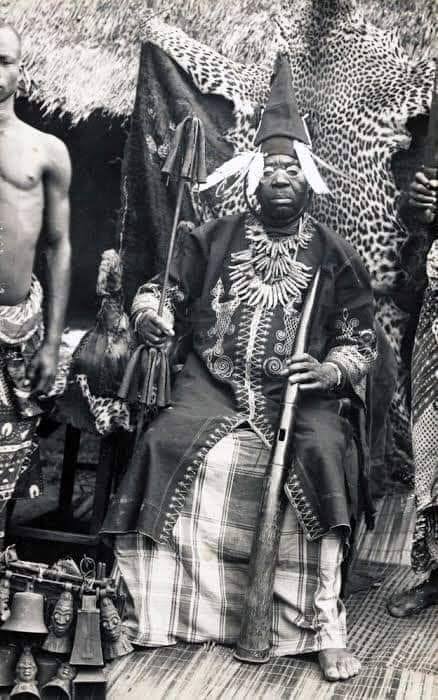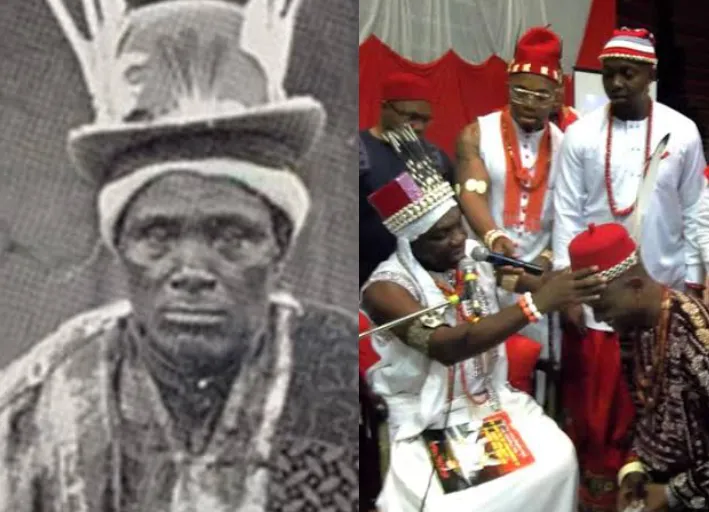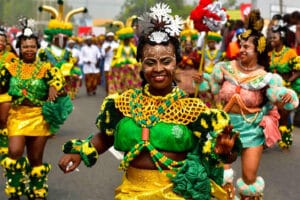The history of Eze in Igbo culture traces sacred origins in Nri, colonial transformations, and the evolving role of traditional rulers today.
The Meaning of Eze in Igbo Culture: Understanding the Role
In many parts of Igbo land today, the word “Eze” instantly commands respect. It’s a title reserved for traditional rulers, those regarded as custodians of culture, mediators of disputes, and symbols of communal authority. But what many may not realize is that the origin and history of the Eze system is far more layered—and not as ancient or uniform across all Igbo communities as one might think.
Let’s step back and explore what the title “Eze” truly means, where it came from, and why it plays such a complex role in Igbo society today.
What Does “Eze” Mean in Igbo Culture?
In the Igbo language, the word Eze simply translates to “king” or “monarch.” But its implications go beyond the English equivalent of royalty. In traditional Igbo society, the title often represents a fusion of spiritual leadership, communal trust, and, in many cases, modern political relevance.
Unlike the centralized kingdoms of the Hausa or Yoruba, the Igbo historically operated a segmentary political system—that is, no central king or sovereign ruled over an entire kingdom. Instead, individual communities governed themselves through councils of elders (ndi ichie), age grades, title holders like the Nze na Ozo, and spiritual priests. In this system, leadership was decentralized, yet culturally rich.
This has led some to wonder: If the Igbo people traditionally had no kings, where did the idea of Eze come from?
A Common Misconception: “Igbo Had No Kings”
You may have heard the popular Igbo saying: “Igbo enwe eze”—which means “The Igbo have no king.” It’s often quoted as a declaration of liberty, reflecting the people’s deep-rooted attachment to independence and community-based decision-making. But that statement, while broadly true in historical context, doesn’t tell the whole story.
The truth is: some Igbo communities have had kings—or king-like figures—for centuries, even if their roles weren’t always political. This is where the history of kingship becomes both fascinating and deeply nuanced.
The Rise of Kingship: The Case of Nri Kingdom
To understand where kingship began in Igbo land, one must look at Nri, a small town in Anambra State that is widely acknowledged as the spiritual heart of Igbo civilization.
The Eze Nri was not a political king in the Western sense. Instead, he was more of a spiritual figurehead, believed to be chosen by the gods and revered for his ritual purity. His duties involved cleansing communities of abomination (nsọ), resolving disputes through divine guidance, and spreading sacred traditions. He wielded moral and religious power, not military force.
This form of kingship—spiritual and decentralized—was quite unlike the royal courts of Benin or Oyo. And yet, it was very real and respected throughout much of precolonial Igbo land. According to historian Elizabeth Isichei, the Eze Nri’s influence spread across vast parts of Southeastern Nigeria, not by conquest but by ritual authority and spiritual diplomacy.
Cultural Dive was rsity: Not All Igbo Communities Had Ezes
While Nri developed a revered priest-king system, many other Igbo communities remained firmly republican in nature. In towns like Awka, Nsukka, and Ohafia, leadership was shared among age grades, warriors, and title holders—without any need for a central king. Instead of one supreme ruler, decisions were made in communal gatherings, with all adult males having a voice.
Even today, if you travel across Igbo land, you’ll find varied expressions of leadership:
- In Onitsha, the traditional ruler is called Obi.
- In Nsukka, some rulers prefer the title Igwe.
- In Arochukwu, the Eze Aro represents both royal and religious authority.
This diversity reflects the fluid nature of kingship in Igbo culture. It wasn’t imposed from above but emerged from within—often evolving as communities grew or as external forces reshaped local governance.
British Colonization and the Shifting Landscape of Eze
One of those external forces was British colonialism. As the British expanded their reach in Nigeria, they struggled to govern the decentralized Igbo. Unlike the Yoruba or Hausa-Fulani, who had centralized rulers that could be co-opted into the system of indirect rule, the Igbo presented a logistical challenge.
So what did the British do?
They created kings.
Through the Warrant Chief System, the colonial government appointed certain individuals as “chiefs” to act as intermediaries between the British and the local people. Many of these warrant chiefs were not legitimate rulers by cultural standards. In some cases, they were even slaves or outsiders imposed on communities without consent.
This move sparked widespread resistance. The Aba Women’s Riot of 1929, one of the earliest mass protests against colonial rule in West Africa, was partly triggered by resentment toward these imposed warrant chiefs and the disruption they brought to traditional governance.
Over time, however, some of these colonial-era titles evolved into recognized traditional stools. Communities began to reclaim them—giving the Eze or Obi real cultural authority, especially in ceremonial matters.
A Living Institution in Modern Igbo Land
Today, the Eze title has become a recognized part of governance and cultural identity in many Igbo communities. While their legal powers may be limited, traditional rulers are still widely respected, especially in local conflict resolution, cultural festivals, and community development.
Some hold advisory positions in state government. Others act as custodians of heritage, overseeing rites of passage, land allocation, and community welfare. For instance, the Obi of Onitsha, Igwe Nnaemeka Achebe, has gained national recognition for his leadership and cultural diplomacy.
To understand the history of kingship in Igbo land is to accept its complex, layered, and evolving nature. The Eze was never a carbon copy of Western royalty. Instead, he represents a living bridge between tradition and modernity, spirituality and community, imposed structures and indigenous authority.
And as we’ll see in the next section, the story of kingship doesn’t end in the past. It continues to unfold—reshaped by politics, culture, and the voices of everyday Igbo people.
The Impact of Colonial Rule and Modern-Day Eze Systemr
The Colonial Twist: How British Rule Changed the Role of Eze in Igbo Culture
To fully understand the modern image of an Eze in Igbo land today, we must look back to a defining historical shift—British colonialism. Before colonization, the idea of a singular, authoritative king was rare in most Igbo communities. But with the arrival of British indirect rule in the early 20th century, the system of leadership was forcefully restructured.
In many ways, the colonial government didn’t just influence kingship in Igbo land—it created new kings where none previously existed.
Why the British Struggled With Igbo Leadership Structures
The British colonial administration, led by Lord Frederick Lugard, had successfully implemented indirect rule in Northern Nigeria by using the existing emirate system—a structured hierarchy with powerful rulers at the top. The Yoruba kingdoms in the West, with their Obas and councils, also fit neatly into the British framework.
But when the British entered Igbo territory, they faced an unexpected problem.
Igbo communities were largely egalitarian and decentralized. There were no grand palaces, no thrones, no kings with armies. Leadership was collective, often based on age, wisdom, and title systems like Nze na Ozo or elder councils. It was a democracy of its own kind—community-driven and spiritually guarded.
To the British, this system was too messy, too unpredictable. So, to govern the area more efficiently, they imposed their own solution.
The Warrant Chief System:
The Warrant Chief System, introduced in the early 1900s, was the colonial answer to the Igbo challenge. It allowed the British to handpick local individuals, often based on perceived loyalty or usefulness, and give them the power to govern.
These new leaders were issued “warrants” or official documents recognizing them as chiefs.
But here’s the issue: many of these warrant chiefs were not chosen by the people. Some were even from slave lineages or were strangers to the traditions of the communities they now ruled. This top-down approach shattered centuries of communal leadership and often led to deep resentment.
In some cases, these warrant chiefs abused their power, imposed unfair taxes, and disrupted traditional land tenure systems. The most famous response came in 1929, when thousands of women across the southeast rose in protest in what became known as the Aba Women’s Riot. It was one of the largest anti-colonial uprisings led by women in African history—and a direct response to the warrant chief system.
How Colonial Rule Redefined the Eze Title
Despite the resistance, some of these colonial-appointed chiefs gradually gained influence. Over time, some communities began to embrace the idea of a central leader, especially where it helped with government recognition, access to development projects, or mediation in land disputes.
In many towns, the title of “Eze” was adopted to give these new leaders a local name that blended with tradition, even if the roots were colonial. This gave birth to the modern political Eze—a figure that looks traditional on the surface but whose authority is partly a product of 20th-century colonization.
For example, in towns like Owerri, Abakaliki, or Umuahia, colonial records from the 1920s and 1930s reveal that several Ezeships were created during this period. These rulers were later formally recognized by both the local people and the independent Nigerian government.
Post-Colonial Nigeria and the Formalization of Kingship
After Nigeria gained independence in 1960, traditional institutions were re-evaluated. In the southeast, kingship had become a permanent fixture. State governments began to legally recognize traditional rulers and create official councils—like the Southeast Council of Traditional Rulers.
Today, every recognized Eze is issued a staff of office, confirming their status under the state’s traditional rulership law. Their role is no longer spiritual alone. Many act as advisors to governors, chair community development committees, and mediate family and land disputes. Some even hold chieftaincy titles that stretch across ethnic and national lines.
In a 2021 report by Nigeria’s National Bureau of Statistics, over 530 traditional rulers were officially registered in the southeast region alone—a significant increase from pre-independence times. This number doesn’t include unrecognized or disputed rulerships still pending community or state approval.
The Eze in Modern Igbo Society: A Hybrid Authority
Today’s Eze lives between two worlds—the world of ancestral tradition and the world of modern politics.
Take, for example, HRH Igwe Nnaemeka Achebe, the Obi of Onitsha. A former Shell executive and one-time Chancellor of Ahmadu Bello University, his reign blends corporate leadership with traditional responsibility. His palace hosts not just traditional ceremonies but also economic summits, cultural festivals, and leadership forums.
Across the southeast, Ezes now:
- Preside over New Yam Festivals and cultural days.
- Host town hall meetings for local politicians.
- Act as gatekeepers of tradition and promoters of development.
In rural areas, the Eze is often the most visible leader—respected more than elected officials. In cities, some serve symbolic roles while others take on urban planning or real estate mediation within their domains.
But this duality raises questions: Are they still true cultural leaders or political appointees? That’s the tension that defines the modern Eze.
From Colonial Tool to Cultural Bridge
The story of kingship in Igbo land is deeply shaped by the collision between tradition and colonial imposition. The British didn’t invent kingship from scratch, but they reshaped it dramatically. What was once spiritual or symbolic became increasingly political and hierarchical.
Still, communities reclaimed the institution—giving it cultural relevance and legal structure.
Today, the Eze is not just a relic of colonial design or a throwback to ancient religion. He is a living symbol of Igbo adaptability: a bridge between old and new, between the sacred and the civic.

Timeline of Kingship in Igbo Land: From Sacred Beginnings to Modern Leadership
The journey of kingship in Igbo land stretches across centuries—from the spiritual corridors of Nri to the colonial courtrooms of British-appointed Warrant Chiefs, and into today’s complex political and developmental space.
Below is a detailed narrative of how the institution of the Eze evolved across key historical periods. Each phase reflects how external influences, internal adaptation, and cultural resilience shaped kingship into what it is today.
Pre-15th Century: Sacred Leadership in Nri and Indigenous Governance
Before the 15th century, most Igbo communities did not have kings in the political sense. However, leadership did exist—rooted in spiritual authority, age grades, title societies, and family lineages.
In central Igbo land, especially in Nri, kingship emerged in the form of the Eze Nri, a sacred priest-king. The Eze Nri was not a warrior or a lawmaker but a spiritual guide believed to be chosen by the gods to purify the land, settle disputes through divine means, and lead religious rites across multiple communities.
According to historians like Elizabeth Isichei, Nri priests traveled widely to perform rituals in distant towns, cementing the non-military influence of the Nri kingdom across Igbo land.
🔗 Read more about Nri Kingdom from World History Encyclopedia
Outside Nri, leadership was mostly decentralized. Communities were governed by councils of elders (ndi ichie), age grades, and clan heads. Decisions were made collectively, and everyone had a role—especially adult males and title holders in institutions like the Nze na Ozo society.
This acephalous (headless) system is why the phrase “Igbo enwe eze” (Igbo have no king) became a cultural proverb.
18th Century: Aro Confederacy and Expansion of Ritual-Political Influence
By the 18th century, the Aro Confederacy began to rise as a powerful network of merchants, ritual specialists, and political negotiators based in Arochukwu.
While not a kingdom in the traditional sense, the Aro Confederacy wielded economic, religious, and diplomatic control over much of southeastern Nigeria through their role as custodians of the Ibini Ukpabi oracle (the Long Juju). They expanded their reach by forming alliances with other Igbo and non-Igbo communities, establishing ritual centers and trade posts.
The Eze Aro, though more political than the Eze Nri, still combined elements of spiritual and hereditary authority. He governed with the support of a council of titled elders and oversaw regional activities involving commerce, land disputes, and war alliances.
This period marked a regional consolidation of power, making the idea of centralized leadership—though still limited—more acceptable in parts of Igbo land.
Early 1900s: The Warrant Chief System and Colonial Disruption
When British colonial officers entered Igbo land in the early 1900s, they quickly discovered that indirect rule—their preferred governance strategy—would not work in a leaderless society. So, they created kings where none existed.
The Warrant Chief System was introduced as a shortcut to local governance. Men—some respected, others not—were handpicked and issued documents (“warrants”) that gave them colonial-backed authority to collect taxes, settle disputes, and enforce British laws.
This system disrupted traditional governance and caused widespread resentment. Many of these warrant chiefs had no ancestral legitimacy and were seen as puppets of colonial power. Some imposed harsh fines, grabbed land, and ruled without accountability.
In many places, the Eze title began to emerge through this system, as warrant chiefs were later crowned as kings—forming the roots of today’s political kingship.
1929: The Aba Women’s Riot and Resistance to Colonial Kingship
One of the most significant uprisings against the warrant chief system was the Aba Women’s Riot of 1929—a protest led by thousands of Igbo and Ibibio women against taxation, corruption, and imposed authority.
These women, from Aba, Owerri, and other parts of the southeast, organized mass sit-ins, market boycotts, and spiritual processions. Their key demands? An end to taxation and the abolition of warrant chief authority, which they viewed as illegitimate.
It was one of the earliest and largest anti-colonial revolts in West Africa—and it shook the foundations of indirect rule in Nigeria.
This moment highlighted how deeply the people resisted imposed kingship, particularly when it clashed with Igbo values of communal leadership and participatory governance.
1960 and Beyond: Post-Independence Recognition and Formalization
After Nigeria gained independence in 1960, the question of traditional authority was revisited. In the southeast, many communities pushed for formal recognition of their Ezes—either as spiritual leaders, community representatives, or cultural ambassadors.
State governments began establishing Traditional Rulers Councils, issuing Staffs of Office, and granting stipends to recognized Ezes.
By the 1980s and 1990s, most states in Igbo land—including Anambra, Imo, Enugu, Ebonyi, and Abia—had adopted laws defining how Ezes were to be selected, enthroned, and recognized.
Ezes became more than figureheads—they sat on panels, mediated conflicts, and even influenced policy at the local and state levels.
2000s to Present: The Eze as Political and Developmental Figure
In recent decades, the Eze has become a hybrid leader—part cultural icon, part political influencer, part development driver.
Traditional rulers now:
- Advocate for road construction, schools, and hospitals
- Host town hall meetings with politicians
- Partner with NGOs and international bodies
- Represent their communities in diaspora events
Prominent Ezes like Igwe Nnaemeka Achebe of Onitsha have rebranded the throne as a tool for diplomacy, leadership training, and youth engagement.
🔗 See The Guardian’s coverage of Ofala Festival and Igwe Achebe
While some critics argue that modern Ezes are “too political” or “mere titles,” others see them as necessary bridges between tradition and transformation.
From the sacred rites of Eze Nri, to the Aro Confederacy’s spiritual-political dominance, through the trauma of colonial warrant chiefs, and into the modern era of state-recognized kings, the Igbo kingship story reflects adaptability, survival, and cultural negotiation.
It is not a fixed institution—it is a living legacy, shaped by time, contested by change, but still respected by many.
As Igbo youths reconnect with identity, language, and roots, the question is no longer “Should kingship exist?”
But rather: “What kind of Eze do we need for the future?”
Kingship Today: How Ezes Are Chosen and What They Do in Modern Igbo Society
Despite its evolving form, kingship remains a central part of many Igbo communities today. The process of becoming an Eze is no longer a mystery hidden in shrine rituals or spiritual visions alone. It is now a well-defined—though still culturally significant—procedure that blends tradition, community approval, and in many cases, government recognition.
Let’s explore how Ezes are chosen today, their responsibilities, and the everyday questions people ask about them.
How Are Ezes Chosen in Igbo Land Today?
The method of choosing an Eze varies from town to town across Igbo land. However, three main models are common today:
1. Hereditary Succession (Dynastic Lineage)
Some communities, especially those with a long-established monarchy, follow patrilineal succession. The title of Eze is passed down through a royal family or ruling house. This model is common in Onitsha, Nri, and parts of Arochukwu.
You can find an example of how royal succession works in Onitsha via the official profile of Igwe Alfred Achebe, Obi of Onitsha.
2. Community Selection Through Consensus
In towns with newer Ezeships, candidates emerge through community consensus led by councils of elders and kingmakers. This method emphasizes moral reputation and ancestral eligibility.
BBC Igbo has covered how internal town union politics and community interviews shape this process today.
3. Government-Endorsed Elections
State governments, especially in Anambra and Imo, now formally recognize Eze titles through legal backing. The issuance of a Staff of Office confirms an Eze’s legal standing under the state’s traditional rulership law. This process is outlined in the Anambra State Traditional Rulers Law.
What Is the Role of an Eze in Today’s Igbo Community?
Today, the Eze plays both traditional and modern roles:
1. Cultural Preservation
They oversee major ceremonies like New Yam Festivals, Ofala, and ancestral rites. For example, the Ofala Festival of Onitsha attracts tourists and cultural enthusiasts from around the world.
2. Conflict Resolution
Ezes still resolve land disputes, marriage issues, and inheritance battles—especially in rural communities. Their judgments often carry communal weight even if not legally binding.
3. Development and Advocacy
They partner with NGOs, development bodies, and state ministries to bring progress to their communities. Some are involved in cultural diplomacy, such as Eze Ndigbo figures outside Igbo land.
For instance, ThisDay Live highlighted how traditional rulers support education and healthcare initiatives through cultural foundations.
Challenges and Controversies in Modern Ezeship
Though many Ezes are respected, issues remain:
Rulership Disputes
Disputes over succession have caused court cases and communal clashes. In 2023, Premium Times Nigeria reported a case of rival Ezes laying claim to a throne in Enugu.
Politicization
Some critics argue that politicians use Eze titles to reward loyalists, weakening the cultural integrity of the role.
Loss of Relevance
In cities, some youth perceive Ezes as irrelevant. However, efforts are ongoing to modernize their role, such as cultural summits and digital storytelling—explored by projects like Culture Advocates Africa.
Frequently Asked Questions (FAQ)
Q: What is the origin of kingship in Igbo land?
A: Kingship in Igbo land began as a spiritual institution, especially in places like Nri, where the Eze Nri was seen as a priest-king and mediator between the gods and the people. However, the idea of widespread political kingship developed during British colonization, particularly through the warrant chief system.
Learn more from Britannica on Nigeria’s pre-colonial governance
Q: How is an Eze chosen in Igbo culture?
A: The selection of an Eze depends on the community. Some use hereditary succession from royal lineages, others rely on community consensus, while many follow a government-regulated process that includes the issuance of a Staff of Office.
Compare systems via the University of North Carolina African Studies Center
Q: Is the Eze the same as Obi or Igwe?
A: Yes, they all refer to traditional rulers, but the title varies by region. “Eze” is more common in Imo and Abia, “Obi” in Onitsha and nearby towns, and “Igwe” is often used in Enugu and Nsukka areas.
See detailed comparisons on AfrikaIsWoke
Q: Do all Igbo towns have an Eze?
A: No, not all towns have a crowned Eze. Some still operate with town union leadership or councils of elders. Others have disputed kingship claims, or choose not to enthrone a traditional ruler for political or historical reasons.
Perfect, John. Below are 6 additional FAQs carefully selected based on real user search intent, Google’s “People also ask,” and low-competition, long-tail queries related to kingship in Igbo land.
These questions are optimized for visibility in Google rich results and structured to blend naturally with the existing ones.
Q: Who was the first Eze in Igbo land?
A: The first recognized Eze in Igbo land is believed to be the Eze Nri from the Nri Kingdom, which dates back over 1,000 years. Unlike political kings, the Eze Nri was a spiritual leader believed to be chosen by divine calling, not force or election. His role focused on ritual purification, dispute settlement, and ancestral blessings.
Q: Why do some Igbo say “Igbo enwe eze” (Igbo have no king)?
A: The phrase means “The Igbo have no king” and reflects traditional Igbo values of egalitarianism and collective decision-making. Historically, many Igbo communities were ruled by councils of elders, not monarchs. While kingship now exists, the saying still highlights the cultural resistance to centralized, autocratic power.
Q: Can a woman become an Eze in Igbo land?
A: Traditionally, kingship (Ezeship) in Igbo land has been reserved for men, but women held influential positions, such as the Omu or female chiefs in communities like Onitsha and Ossomari. In some rare modern adaptations, female regents or queens may act as interim leaders if male heirs are too young or unavailable.
Q: What is the Ofala Festival, and how is the Eze involved?
A: The Ofala Festival is an annual celebration where an Eze or Obi makes a public appearance to bless the people, honor ancestors, and display royal regalia. It’s common in Onitsha, Nnewi, and other Igbo kingdoms. It serves both cultural and political purposes, attracting dignitaries and tourists.
Q: Does an Eze have legal power under Nigerian law?
A: An Eze is not a legal authority like an elected official, but many are recognized by state governments through a Staff of Office. This gives them a customary role in resolving disputes, maintaining peace, and representing the community. They also serve on traditional councils at the state level.
Q: Can someone challenge or dethrone an Eze?
A: Yes, but it depends on the community’s constitution and state laws. If an Eze violates traditional or legal norms—such as by abusing power or becoming politically partisan—he can be petitioned, investigated, or even dethroned by a traditional council or state authority. Such disputes are often settled in customary or civil courts.
Q: What is the difference between an Eze and a town union president?
A: An Eze is a traditional ruler whose authority is rooted in custom and heritage, while a town union president is an elected community leader who manages social and development affairs. In many places, both roles coexist: the Eze offers cultural guidance; the union president handles logistics and public projects.
Conclusion:
Kingship in Igbo land has always been dynamic—molded by both ancestral reverence and colonial necessity. But what remains clear is this: the Eze today stands not just as a cultural relic but as a community anchor—guiding people through disputes, traditions, and transitions.
Whether in the hills of Nsukka, the riverbanks of Onitsha, or the rural heartlands of Mbaise, the Eze system continues to evolve—alive, relevant, and deeply Igbo.




